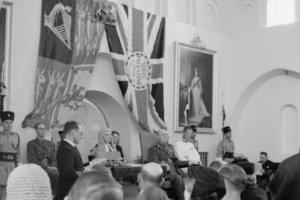How Britain broke international law to stop Palestinian independence and the claim for reparations

Field Marshal Viscount Gort (seated, with the flag of the Palestine High Commission behind him) being sworn in as high commissioner and commander-in-chief of Palestine and Transjordan at Government House, Jerusalem, 1 November 1944
Shawan Jabarin and Ralph Wilde write in Mondoweiss:
In his speech before the UN General Assembly last week, Palestinian Authority President Mahmoud Abbas called for “reparations…in accordance with international law” against the UK for the “fateful Balfour declaration.” That declaration was made by British Foreign Secretary Arthur Balfour in 1917, pledging to establish a “national home for the Jewish people” in Palestine, despite Palestine already being inhabited by mostly non-Jewish Palestinians. Is there a legal basis for reparations for something that happened when global norms were different from how they are now? Based on new research, we argue that there is, and the key to this is a legal agreement adopted one hundred years ago today.
The Balfour pledge itself is merely a political statement. It is of dubious legal standing as a binding commitment made when the UK had no authority over Palestine. What makes it significant politically, practically, and legally is something else with a different date.
At the end of the First World War, the victorious allies took over the colonies of the defeated powers. The UK became the power in Palestine, displacing the Ottoman Empire. These arrangements were placed under the authority of the League of Nations in the Mandates system, subject to the rules of the League Covenant, part of the Versailles Treaty.
The administration of each Mandate was set out in a “Mandate Agreement,” itself a legally-binding instrument adopted by the governing Council of the League.
The Palestine Mandate Agreement incorporated the Balfour commitment and expanded it into a detailed set of objectives for colonial rule. This then formed the ostensible legal basis for how the UK implemented these objectives in practice: holding on to the territory for a quarter of a century and enabling Jewish migration, Jewish land and property ownership, and the creation of Jewish institutions of self-government. This paved the way for the proclamation of Israeli independence in part of Palestine in 1948. Thus, as a matter of international law, it is the Mandate Agreement, not the Balfour Declaration as such, that is the key legal instrument. That Agreement entered into force on September 29, 1923 — one hundred years ago today.
The legal conundrum is that there is a fundamental contradiction between the Balfour plan in the Agreement and Article 22 of the League Covenant, which required that the Mandates of the former Ottoman Empire, such as Palestine, be “provisionally recognized” as “independent nations.”
New research reveals a factor hitherto ignored when this contradiction has been assessed by experts — whether or not the League Council had the legal power to seemingly bypass the requirement of the Covenant to provisionally recognize statehood through the 1923 Agreement.
